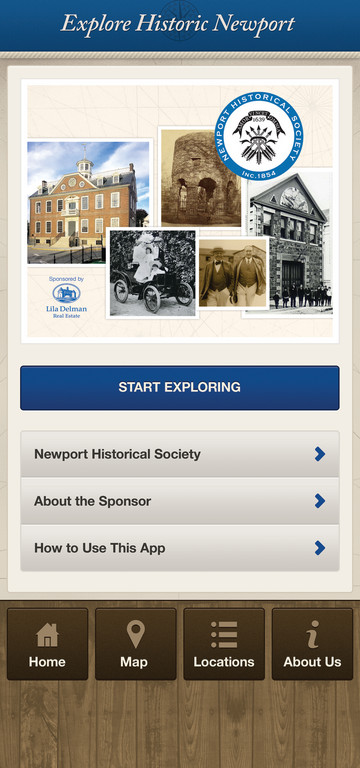
It’s long been known that the ladies room can be a place where ideas – and more than those centered on gossip or shopping recommendations – can be shared.
So it wasn’t surprising to Ruth Taylor, executive director of the Newport Historical Society, that an advertisement for the organization’s new mobile guidebook placed on a lavatory wall garnered quite the positive reaction.
“[This woman] came out all excited. She photographed and accessed the [site] code. We hope there’s a lot of that,” Taylor said. “It’s [only] a gimmick if people don’t use it the way it is intended and we really won’t know that for a while yet.”
“Explore Historic Newport,” the society’s foray into mobile tourism that has put it ahead of the curve for agencies and businesses in this area, launched in early July.
Taylor calls it a combination of guidebook and virtual exhibit of historic Newport and its structures that tourists can hold in their hands as they walk around the city.
“We wanted to give people an opportunity to be walking around Newport to get information about what they see on the street and it’s nearly impossible in a face-to-face way,” Taylor said. “We were a little surprised to be able to be [leaders].”
But leaders they are in that the tour – a Web-based application – is one visitors can take on their own, entirely self-guided, at their pace alone and based exclusively on their preferences.
There are 50 Newport sites included.
Though it’s not a mobile application – commonly referred to as an “app” by avid smartphone users, it’s closer to one than other tourism business leaders have gone.
But those leaders say there’s a perfectly good reason for that.
“We, over the last two years, looked at mobile websites versus mobile apps and our research told us, definitely and definitively, that websites were a higher priority,” said Evan Smith, executive director of Discover Newport, the marketing organization for Newport County. “Apps are coming in all shapes and sizes [but] I think websites are outpacing apps at a fairly significant pace.”
A mobile website must be accessed through a phone’s browser.
There are many reasons, Smith and others said, why mobile sites work better for them. For one thing they can be accessed when needed – which may not be all that often and only when a tourist is in town. An app can take up storage space on a phone.
“It’s just easier for a user to type in a URL address and the site instantly comes up versus having to download an app when [for this business] there’s not really a lot of updates,” said Cherie Daniel, owner of CC Inspire, a website-design and -development firm in Bristol. “You’re seeing more and more sites that are on a mobile platform. It gives people information right away.”
Daniel’s clients include Discover Newport, the Block Island Tourism Council, the R.I. Airport Corporation, and the Preservation Society of Newport County, which manages the Newport mansions and is set to roll out its mobile site this summer.
John Rodman, director of museum experience at the society, said the site development is its latest effort to stay digitally current.
After trying out audio tours at some of the smaller Newport mansions, such as The Elms, over the last 10 years, such tours were introduced at The Breakers, its largest attraction with some 360,000 visitors per year, about a year and a half ago. All ticketing for mansion tours has been digitized and, Rodman said, visitors are now scanning tickets saved to their phone.
“This explosion in the use of handheld devices and people’s desire to use [them] means that the next obvious step for us is provide a purposeful mobile platform,” he said. “It’s very simply going through [our website] and saying what things are going to transfer easily and put them on the mobile site.”
With Discover Newport, for example, CC Inspire pulls information from its main site and makes it work for a phone. That typically means downplaying photography, as too many images can slow a connection, developing big-enough link buttons so people’s fingers can click on them, and consolidating information to present everything important in a relatively small amount of text.
“[It’s giving] quick, to-the-point information rather than mulling through a website,” Daniel said. “I’ve seen a lot of other sites out there that their content isn’t rich and up to date because it’s a separate entity. You don’t want that. Integration is key.”
The Newport Historical Society’s site, Taylor said, is meant to compliment its guided tours, not to compete with them.
The Providence Warwick Convention & Visitors Bureau also has relied on its mobile site for an on-the-go presence.
Kristen Adamo, vice president of marketing and communications, points to advice from HSW Solutions, a Framingham, Mass. Internet-strategy firm that specializes in nonprofits, which touts mobile sites as better for immediacy, compatibility, reach, time and cost.
Bob Burke, a Providence restaurateur who runs the Independence Trail from his Independence Trail Education Foundation, formally established by state proclamation in May 2011, sees his cellphone-based tour as dependent on rudimentary technology.
“We are deliberately designed at the base of the technology pyramid,” Burke said. “What happens a lot of times is that people get excited about being on the tip of the arrow and you end up [with problems]. I will refer to them as confections. They are sweet, they are fun, but they’re not what you’re going to build a business on.” •












